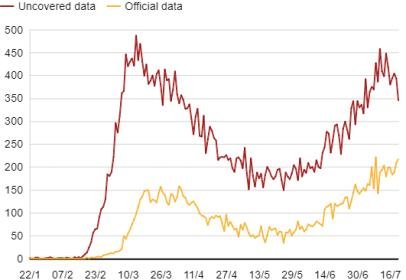Iran: Coronavirus Death Toll in 450 Cities Exceeds 117,200
The number of patients and victims, especially in Tehran, is increasing every day, hospitals have no vacancies, and the regime is not taking any action
Masoud Mardani, member of the Scientific Committee of the National Coronavirus Combat Taskforce (NCCT): None of the hospitals I work in has an empty bed. Other hospitals are also full. (State TV, October 5, 2020)
Alireza Zali, head of NCCT in Tehran: 116 people, died in Tehran in 24 hours. We had the worst situation in the past 72 hours. Twenty-five in every 100,000 people is infected, which is considered critical and red. In Tehran, we are moving far beyond this threshold. (State TV, October 5, 2020)
Head of Infectious Diseases Department of Masih Daneshvari Hospital: In Tehran, with even 105 hospitals that accept Coronavirus patients, we do not have an empty bed. (State TV, October 5, 2020)
Head of ICU of Rasool Akram Hospital: Although we have four ICU wards, there is no room for new patients unless a patient dies or is transferred. This Coronavirus wave is much worse than the previous two. (State TV, October 5, 2020)
Mrs. Maryam Rajavi, the President-elect of the National Council of Resistance of Iran (NCRI), hailed the doctors and nurses who are trying to save the lives of patients by accepting the highest risks. She said: Now everyone sees that it’s the clerical regime that is directly responsible for the growing number of Coronavirus victims. Instead of financing the laborers for a few months out of the billions of dollars of wealth and assets of the Iranian people in the hands of the regime’s supreme leader, Khamenei and Rouhani are sending them to the killing ground of the Coronavirus while they continue to squander the country’s resources on incitement to war, terrorism, as well as missile and nuclear projects. Meanwhile, regime officials report overcrowded hospitals and a large number of helpless patients who are waiting in queue to be admitted, especially in Tehran. This is while Khamenei is not giving any money to combat Coronavirus, and Rouhani continues with his disgusting lies about how advanced the economic and healthcare systems are! In a situation where the bitter and painful number of casualties is approaching 120,000, the Revolutionary Guards must be disbanded, and its budget and facilities allocated to the healthcare system to help combat Coronavirus.
The People’s Mojahedin Organization of Iran (PMOI/MEK) announced on Tuesday, October 6, 2020, that the Coronavirus death toll in 450 cities across Iran had exceeded 117,200. The number of victims in Tehran is 27,841, Khorasan Razavi 8,800, Khuzestan 7,538, Isfahan 5,964, Mazandaran 5,457, Qom 5,090, Gilan 4,691, East Azerbaijan 4,068, Alborz 3,215, Fars 3,136, Kermanshah 2,583, Kerman 1,793, Semnan 1,756, Central Province 1,525, and Bushehr 1,425.
The Spokesperson for the regime’s Health Ministry put the number of infections in the past 24 hours at 4,151 and the number of critically ill at 4,200, which is a record for the regime since the beginning of the Coronavirus outbreak.
Iraj Harirchi, regime’s Deputy Health Minister, told ISNA today, “We have a significant problem at Intensive Care Unit wards and referral hospitals. For seven to eight months, our medical staff have been working with all their might. While we are facing the exhaustion of the staff; we are also overusing some of the equipment beyond their capacity; Equipment such as CT scans, oxygen generators, and ventilators. Due to their age, some of these equipments are out of order or need to be repaired, which is also a significant issue and a big challenge.






